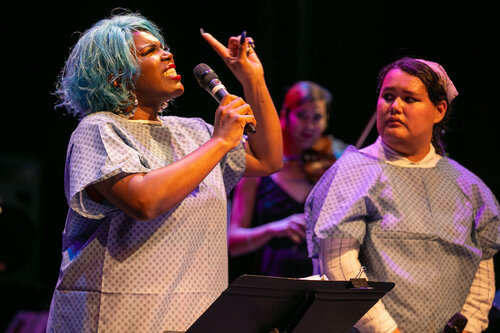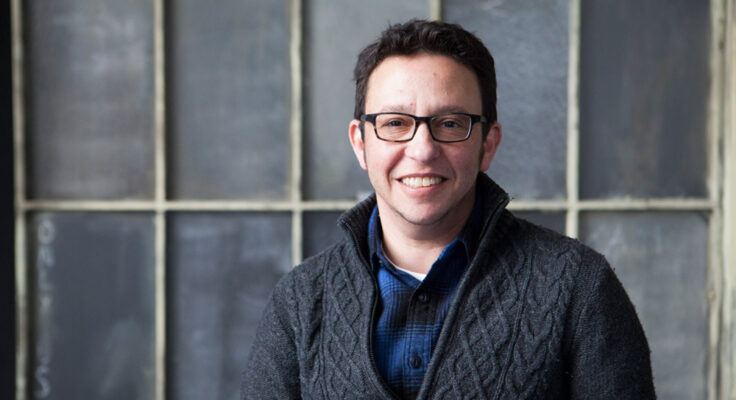The Kenneth Rainin Foundation aims to help Bay Area artists thrive by providing resources for alternative organizational models that support a more resilient and equitable ecosystem. Part of this work is being advanced through our New Models Cohort, a group of six small to mid-size Bay Area nonprofit theater and dance companies. Leaders from these organizations are working together to re-envision their operating models, develop new approaches to sustainability and consider deeper commitments to equity.
The COVID-19 pandemic has had a devastating effect on arts organizations, so we were particularly thrilled to celebrate a bright spot with one of the cohort organizations. In April 2021, Z Space announced its new distributed leadership model along with an enormous milestone—the first openly transgender executive director in American theater, Shafer Mazow. Diversity in arts leadership is important, especially at Z Space, which is in San Francisco’s Mission District and home to many theater and dance companies, individual artists, and independent producers. Z Space’s milestone shows what’s possible when organizations are supported to move beyond traditional models and embrace diversity.
I invited Shafer to share more about what this new position means and how he is approaching leadership in this moment. His reflections are below.
Reflection By Shafer Mazow
Ritual, Resilience And Time
I am, I think, the first openly trans executive director in the American theater. This is a big moment not just for me and Z Space but for nonprofit theater, because of the tremendous milestone my appointment reflects for the field. Many people helped me and Z Space get to this moment, including the Rainin Foundation.
As part of the Rainin Foundation’s New Models Cohort and in conversation with local and national practitioners about equity, diversity and inclusion, Z Space has been developing and iterating a distributed leadership model for several years. We were well aware that one of the greatest challenges of leading an organization is often more complicated than the financial burden: it is carrying the weight, managing the physical and psychological exhaustion and avoiding the burn-out that so many solo leaders feel. And that was before the pandemic. We also knew that Z Space serves a breadth of multidisciplinary artists and having a multitude of artistic visions at the top would better represent our actual programmatic model. Thanks to sustained support from the Rainin Foundation and other forward-thinking funders, I had access to leadership and thoughtful mentorship, time to gain specific skills and experience, time to earn the kinship and trust of Z’s community, and opportunities to innovate as part of a team. These were all essential steps in preparing me to assume the role of Executive Director in a three-pronged leadership structure that includes my position, alongside a Curatorial Director and a Producing Director who each have oversight of Z Space’s two independent but interrelated artistic tracks.
Sharing Leadership During A Pandemic

The story of my path to Executive Director is more frantic than most. Lisa Steindler, the then Executive Artistic Director of Z Space, took a sabbatical in early 2020 and was on a boat in the middle of the ocean when COVID-19 hit. I was working alongside Rose Oser (Associate Artistic Director) and Abigail Panares (General Manager), and while the three of us had spent months preparing for Lisa’s sabbatical, we had to face urgencies and decisions no one could have predicted, while adhering to a stipulation from the sabbatical funder that we could not contact Lisa for any reason. The reimagined model allowed us to share some of the pandemic panic; it allowed us to each focus on our individual strengths; it allowed us to support and uplift one another in a time of crisis. And we did it together, with a common language and grounding in the core principles we had collectively articulated for the organization.
As Z Space was preparing to reopen in October 2021 and now that we must close our doors for the second time in the face of the latest COVID variant, I remind myself that my reflections on nontraditional leadership are situated in this specific moment in time, with all of its loss, uncertainty, anxiety, frustration, uprising and hope for revolution. A few themes have emerged as I think about my role and what the future holds.”
Demanding New Rules About Who Belongs
I’ve been thinking a lot about ritual. In August I hosted a virtual shiva for a dear colleague and friend. Sitting shiva is a Jewish practice of mourning. This particular ritual, whose basic purpose is to provide comfort for the mourners, feels so healing, so meaningful as a way to grieve in community and to practice collective care. But in the more ancient traditions of my upbringing, only men (cismen that is) counted as part of the necessary quorum of ten worshippers, the “minyan”…and I wasn’t one of them.
So, why was it important for me to host this specific ritual, and use its names and customs as a framework for my and my community’s grieving process? Traditions are important to me, and I wanted to hold the essence of that shared practice and imagine it in a way that I get to be included. To demand new rules about who counts, who belongs.
“We’re in a moment where we are called to demand new rules about who can engage in that magic and how.”
And what does this have to do with nontraditional leadership in theater? The traditions and rituals of theater are important to me—the timeless collective practice of telling, hearing, and experiencing stories in place together, in common time, in all of its forms. Who gets to decide who counts in that context? We’re in a moment where we are called to demand new rules about who can engage in that magic and how.
Resilience And Discomfort
I’m reminded of a conversation I had with my sister a few years back. We were talking about some shared adversity we experienced; and while I ranted, she said she was grateful, “Look how resilient it taught us to be.” I thought, “C’mon. Really? Do we have to find blessings in every hardship? Can’t we just be angry?”
“I think a lot about challenging the notions of who gets to be comfortable and at what cost to others.”
But fast-forward a few years and proposed bathroom bills across the country, including those in my hometown, still threaten the health and well-being of trans and gender-nonconforming people like me. Can’t I just be angry? I think a lot about challenging the notions of who gets to be comfortable and at what cost to others. My sister’s positivity has haunted me in that regard, some kind of lingering guilt that there is something I am supposed to do with my personal discomfort besides being angry. I think it’s fair to extrapolate from my own experience and say that there is a necessary resilience in otherness, in having to find your way in a world that has yet to understand you or even believe that you exist. That’s a pretty important skill for leaders these days—and for those of us “others,” it’s our superpower.
Evolving In Our Own Time
There are so many practical things we as theater leaders can do at and in this moment to redefine leadership and redistribute agency. So many organizations and individual practitioners are digging into the real work of self-examination, accountability, community-building and repair, and taking action to confront long-held practices of exclusion and devaluation. Supporting leaders of difference is a crucial component of this work as is the continued investment in finding new paradigms that expand access and insist on more diverse, inclusive, and welcoming spaces and theater practices. We need to complexify, to actively seek out abundance and multiplicity.
“…there is a necessary resilience in otherness, in having to find your way in a world that has yet to understand you or even believe that you exist. That’s a pretty important skill for leaders these days—and for those of us ‘others,’ it’s our superpower.”
The other thing I have been chewing on is time. We’ve all joked about our lives in COVID, that time has no meaning. What’s a day, a week, a month? I’m a nerd so I did some reading and found a widely accepted scientific postulate that says physics does not describe how things evolve “in time” but how things evolve in their own time. And that time passes more slowly for things in motion than those in stasis. That framework has given me some hope, because I feel more in motion than in stasis. I also feel ready to let Z Space evolve in its own time, in a way that makes room for a world we have yet to imagine.
“Supporting leaders of difference is a crucial component of this work as is the continued investment in finding new paradigms that expand access and insist on more diverse, inclusive, and welcoming spaces and theater practices.”
About The Author
Shafer Mazow is the Executive Director of Z Space, a multifaceted performing arts venue for relevant and risk-taking new works, located in San Francisco’s Mission District. He serves on the boards of Theatre Bay Area and the National Queer Theater. Shafer is also a writer, theater artist, fundraiser and activist with 20 years of experience working in program development and strategic initiatives at the intersection of art, science, and social justice. He has focused his professional and creative efforts on deepening understanding of gender, its complex intersections with other aspects of identity, and the implications of oversimplified binary categories.
The Rainin Foundation welcomes guest blogs from our grantees and partners. If you have an idea for a story you’d like to share that would be helpful to the field, contact our communications team.

